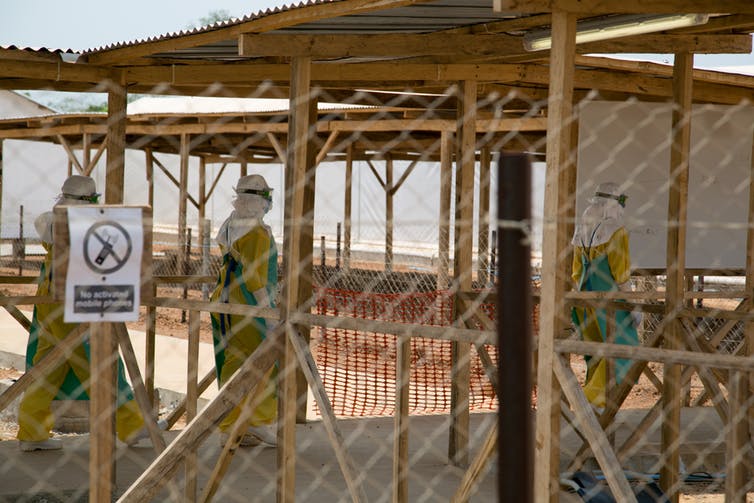Can we treat Ebola with plasma? The results are in

Dr Rebecca Inglis, Author provided
Peter Horby, University of Oxford and Catrin Moore, University of Oxford
During the Ebola outbreak of 1995 in the Democratic Republic of Congo, eight patients with Ebola were given blood transfusions from people who had recently recovered from Ebola. Seven of them survived. ![]()
The blood of people who have recently recovered from an infection contains antibodies that the body develops naturally to fight that infection. The transfusion of these antibodies into infected individuals (as whole blood, plasma, or concentrated antibodies) has a long history and has been proposed as a possible treatment for Ebola virus disease.
With the mortality from Ebola in the 2014-15 West Africa outbreak reaching 70% at its peak, a key question was whether transfusion of plasma (blood with the red blood cells taken out) taken from recovered patients into sick patients could improve survival.
Field trial
Together with our colleagues at the Institute of Tropical Medicine in Antwerp, Belgium we recently published the results of the biggest ever study of the use of convalescent plasma to treat Ebola.
The Ebola-Tx trial was based at the Donka Ebola Treatment Centre in Conakry, Guinea. During 2015, 84 Ebola patients were given a transfusion of the plasma from recovered Ebola patients. The survival rate in these patients was compared with the survival of 418 Ebola patients treated in the same centre in the five months before the clinical trial of convalescent plasma began.
Although the treatment was well tolerated, there was no significant reduction in death 14 days after transfusion in the patients treated with convalescent plasma.
Patients were followed up to confirm survival two weeks after they were treated. At 31% (26 patients), deaths in the group treated with convalescent plasma was slightly lower than in the group that didn’t receive a plasma transfusion (38%; 158 patients). But the 7% difference was narrowed to only 3% when we took the patient age and the amount of virus into account. The result was no longer statistically significant. So does this mean that convalescent plasma does not work?
Not the end of the road
Certainly the treatment did not result in a large decrease in mortality but this does not mean that convalescent plasma should be written off.
The concentration of antibodies in plasma can vary naturally and the team were not able to measure the concentration of antibody in the plasma before giving it to the patients. It is likely that some of the plasma had a low concentration of antibody and some had a high concentration.
Further analyses are needed to see if the mortality was lower in patients who received plasma with a high antibody concentration compared with those who received plasma with a low antibody concentration. If this is the case, transfusion of higher concentrations of antibodies might provide a benefit and may be useful in the future.
A laboratory in France is currently analysing the antibody concentration in the plasma samples and the results will be extremely important for deciding on the future for convalescent plasma treatment for Ebola.
Future studies may examine the optimal volume of plasma needed to treat Ebola virus disease and the number of doses that are required. Also, although only a small number of very young children and pregnant women were enrolled in the trial, there was a hint that convalescent plasma might be beneficial in these two groups, both of which have a very high risk of death from Ebola.
Major step forward
Although the results are negative in that the type and volume of plasma given in this trial did not improve survival, the study has many important implications. It has demonstrated that convalescent plasma can be collected in very challenging circumstances and safely given to Ebola patients. There was a willingness of survivors to donate their blood and of patients to receive transfusions of blood products.
The infusions could be safely given within the difficult environment of an Ebola treatment centre without major risks to either the patients or the health care workers. Most importantly the trial represents a major step forward in reducing uncertainty about the value of convalescent plasma for Ebola and potentially paves the way for further trials using more concentrated antibody preparations.
Peter Horby, Professor of Emerging Infectious Diseases and Global Health, University of Oxford and Catrin Moore, Project Manager, Epidemic diseases Research Group Oxford (ERGO), University of Oxford
This article was originally published on The Conversation. Read the original article.
Filed Under: Drug Discovery



